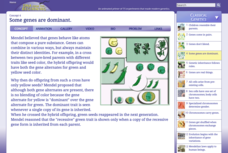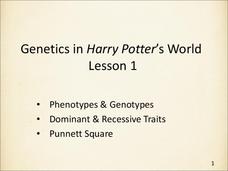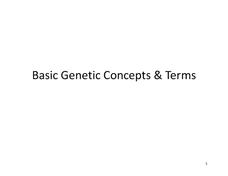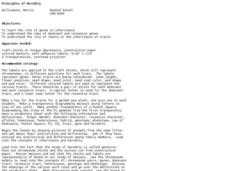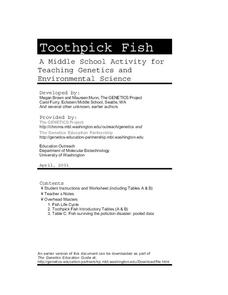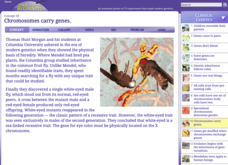Curated OER
Rock, Paper, Scissors - Dominant and Recessive Traits from Parent to Offspring
Fifth graders understand the meaning of dominant and recessive. In this dominant and recessive traits lesson, 5th graders participate in a game and record results on a chart. Students relate experiment to genes. Students describe plants...
Beyond Benign
Lucky Brand Genes: Genetic Traits
Explore single-gene traits in humans. After viewing a video introducing genetic vocabulary, individuals identify their phenotype and possible genotypes of specific traits. They consider both dominant and recessive traits. This is the...
Cold Spring Harbor Laboratory
Some Genes Are Dominant
Dominate a lesson on genetic traits. Young scholars learn about the difference between dominant and recessive traits with an interactive lesson. An animation demonstrates Mendel's work on the inheritance of traits, and interactive...
Curated OER
Genes, not Jeans
Fifth graders examine the difference between dominant and recessive genes, and what happens when genes are combined. They complete a worksheet on genetics after observing if they can wiggle their ears or roll their tongues. They...
Curated OER
Gene Puzzles
Students come to understand that in sexually reproducing organisms, such as humans, typically half of the genes come from each parent.
Students examine a fictional pedigree and determine which gene is responsible for a given trait. The...
Curated OER
What Genes Do You Have?
A great handout to introduce genetics. Young geneticists will begin to examine which traits are prevalent in their own families, helping them begin to understand the concept of dominant and recessive genes. This is an excellent resource...
Curated OER
Evolution and Gene Frequencies: A Game of Survival and Reproductife Success
Students research the population of Bengal tigers and their existence as either dominant or recessive. They explore the presence of fur on these tigers and its lethal combinations. Determinating the effect of random mating in a...
US National Library of Medicine
Genetics in Harry Potter’s World Lesson 1
By the end of Harry Potter and the Deathly Hallows, we know Harry and Ginny get married, but what will their kids look like? This presentation introduces viewers to Punnett Squares and how to use them to determine both...
Curated OER
Genome: The Secret of How Life Works
What do you have in common with a fruit fly? About 60 percent of your DNA. The resource, divided into two units, is intended for grades four to eight and another for high schoolers. Both units include eight lessons covering the...
US National Library of Medicine
Basic Genetic Concepts and Terms
Have you ever wondered why you aren't taller or invisible? It all comes down to your dominant and recessive genes. Introduce your class members to genetics with a presentation that includes worksheets for young geneticists to...
Curated OER
Wearing My Genes: Basic Principles of Heredity
Students explore heredity. In this science lesson plan, students examine what heredity is, distinguish the difference between the dominant and recessive genes, explain the difference between phenotype and genotype, and predict the...
Biology Corner
Pipe Cleaner Babies
Ever been told you have your father's eyes? How did it happen? Young biologists get a hands-on experience in meiotic gene expression with a fun pairs-based activity. Participants use pipe cleaner chromosomes with trait beads to make...
Curated OER
Where'd You Get Those Genes?
Really a unit, this resource exposes middle schoolers to genetics at their level. They read interviews and biographies, trace a family tree, play games that simulate inheritance concepts, and more! Teacher's procedures, student...
North Carolina State University
Exploring Genetics Across the Middle School Science and Math Curricula
Where is a geneticist's favorite place to swim? A gene pool. Young geneticists complete hands-on activities, experiments, and real-world problem solving throughout the unit. With extra focus on dominant and recessive genes, Punnett...
Science Friday
Colorful Chromosomes
Everything is in the genes. Individuals observe 14 different traits of themselves. Using pipe cleaners and beads, the learners create models of a chromosome representing their traits. The class then compares and contrasts everyone's...
Curated OER
AP: Chapter 14: Mendel and the Gene Idea
A survey of Mendelian genetics is presented through this handout. Biology prodigies answer questions about the Law of Segregation, phenotypic ratios, and dominance. They define genetics vocabulary terms and describe various genetic...
Curated OER
Principles of Heredity
Students model traits on genes using colored paper and tongue depressors to represent chromosomes. In this heredity lesson plan, students use their "chromosome sticks" to understand chromosome pairs, genes, dominant traits, recessive...
Curated OER
Mendelian and Non-Mendelian Heredity
Tenth graders discuss their physical features, and why they look the way they do. They listen as the teacher discusses DNA, alleles, and dominant or recessive genes. Students perform an experiment with different colored markers...
Scholastic
Study Jams! Heredity
Mia wishes her blue hair was inherited so that she wouldn't have to dye it, but Sam explains that eye color is. The video does not expound upon the concept of alleles. It does, however, describe inherited traits vs. learned behavior, and...
Curated OER
Basic Introduction to Foundation of Life: Genes, Genetics and Genetic Diseases
Students are introduced to genetics along with genetic diseases and heredity. In groups, they complete a Punnett Square to determine the dominant and recessive genes. After viewing diagrams, they identify the characteristics of DNA and...
Curated OER
Happy Face Spider Propagation
Students research genetic adaptations. In this chromosome lesson, students investigate dominant and recessive genes using spiders indigenous to Hawaii. Students create Punnett squares to determine the probability of passing specific...
University of Washington
Toothpick Fish
With colored toothpicks representing genes, youngsters practice passing them through generations of fish and learn about heredity. Consider this as an introductory activity since it does not represent recessive genes with lowercase...
Cold Spring Harbor Laboratory
Chromosomes Carry Genes
Some traits only exist in males and some only in females. Pupils learn how the location of genes on sex chromosomes determines them using an interactive lesson. An animation illustrates how scientists know this to be true and shows how...
Curated OER
Dragon Genetics ~ Independent Assortment and Genetic Linkage
Imagine a pair of dragons that produce offspring. What percentage of the hatchlings have wings and large antlers? An engaging activity draws genetics learners in, introduces them to alleles, meiosis, phenotypes, genotypes, and...




